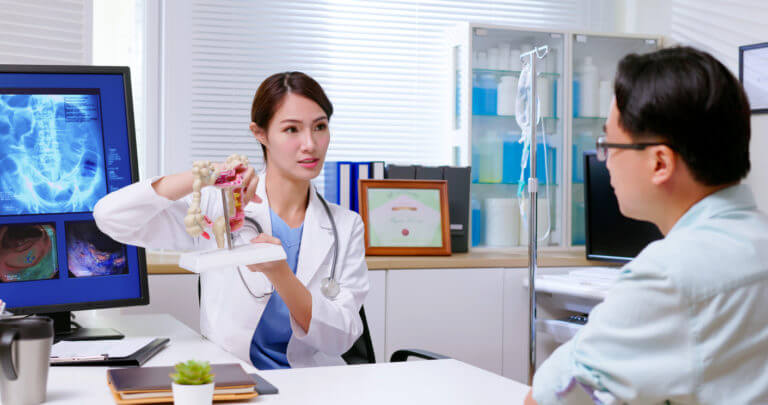
Have you ever heard of an endoscopy or colonoscopy and wondered what they are all about? These procedures may sound complex, but they’re common tools doctors use to keep us healthy. In this article, we’ll break down some key gastroenterology procedures like endoscopy, colonoscopy, and a few others in simple terms.
Whether you’re preparing for one of these procedures or just curious, let’s walk through what they are, why they’re done, and what to expect.
The Most Common Gastroenterology Procedures
Understanding these common procedures can help us understand what happens during gastroenterologists’ appointments.
Here are some of the most frequently performed gastroenterology procedures:
Upper Endoscopy (EGD)
An upper endoscopy, also known as esophagogastroduodenoscopy (EGD), involves inserting a thin, flexible tube with a camera through the mouth to examine the:
- Esophagus
- Stomach
- Beginning of the small intestine
This procedure is often used to diagnose and sometimes treat conditions like acid reflux, ulcers, and celiac disease.
Colonoscopy
Perhaps the most well-known gastroenterology procedure, a colonoscopy, allows doctors to inspect the entire colon and rectum. It’s primarily used for colon cancer screening but can also:
- Detect and remove polyps
- Identify areas of inflammation
- Take tissue samples for biopsy
Sigmoidoscopy
Like a colonoscopy, a sigmoidoscopy examines the lower part of the colon (sigmoid colon) using a shorter tube.
It’s often used to investigate symptoms like rectal bleeding, diarrhea, or pain.
Capsule Endoscopy
In this procedure, the patient swallows a small, pill-sized camera that captures images of the small intestine as it passes through.
It’s particularly useful for diagnosing conditions that are hard to detect with other methods, like Crohn’s disease or small intestinal tumors.
ERCP (Endoscopic Retrograde Cholangiopancreatography)
ERCP combines endoscopy and X-ray to examine the pancreatic and bile ducts. It’s commonly used to diagnose and treat conditions like gallstones, pancreatitis, and bile duct obstructions.
Liver Biopsy
A liver biopsy involves taking a small tissue sample from the liver, usually with a needle, to diagnose liver diseases and conditions such as hepatitis, cirrhosis, or liver cancer.
pH Monitoring
This procedure measures the acidity level in the esophagus over 24-hours. It’s often used to diagnose and manage acid reflux or gastroesophageal reflux disease (GERD).
Each procedure plays a vital role in diagnosing and treating gastrointestinal issues.
Understanding what these procedures entail makes patients feel more informed and at ease when discussing options with their healthcare providers.
When to Visit a Gastroenterologist
It’s essential to know when it’s time to seek the expertise of a gastroenterologist. These specialists are trained to diagnose and treat conditions affecting the gastrointestinal (GI) tract.
Here are some key signs and situations when you should consider making an appointment:
1. Persistent Digestive Issues
If you’re experiencing ongoing digestive problems that don’t improve with over-the-counter treatments, it’s time to see a specialist. These include:
- Chronic heartburn
- Acid reflux
- Constipation
- Diarrhea
- Bloating
2. Abdominal Pain or Discomfort
Unexplained, recurrent, or severe abdominal pain can be a sign of various GI conditions and should be evaluated.
3. Difficulty Swallowing (Dysphagia)
This could indicate a problem in the esophagus, such as strictures or esophageal cancer.
4. Gastrointestinal Bleeding
Symptoms like blood in the stool, black or tarry stools, or vomiting blood are serious signs that require immediate medical attention.
5. Family History of GI Diseases
If you have a family history of gastrointestinal diseases, such as colon cancer or Crohn’s disease, you should consult a gastroenterologist for screening and preventive care.
6. Anemia or Unexplained Weight Loss
These symptoms can sometimes be linked to GI issues like peptic ulcers or celiac disease.
7. Screening for Colon Cancer
Adults over the age of 45 (or younger, depending on risk factors) should undergo regular colon cancer screenings, typically via a colonoscopy.
8. Concerning Symptoms
You may need to visit a gastroenterologist if you experience symptoms like:
- Jaundice
- Chronic fatigue
- Unexplained itching
- Abdominal pain radiating to the back
- Weight loss
- Changes in stool
The first three symptoms might be indicative of chronic liver disease, while the other half may be signs of pancreatic disease.
9. Changes in Bowel Habits
Significant changes in bowel habits, such as chronic diarrhea or constipation, especially if accompanied by abdominal pain, can be signs of underlying GI disorders.
It’s always better to seek professional advice early.
Gastroenterologists can provide specialized care, conduct necessary tests, and offer treatment options tailored to your specific needs.
Early diagnosis and intervention can make a significant difference in managing and treating gastrointestinal conditions effectively.
The Best Gastroenterology Doctor in New Jersey
Are you in search of the best doctor for gastroenterology in New Jersey? Look no further than the Hudson MD Group. Our exceptional team provides high-quality treatment and management for a comprehensive range of conditions, including gastroenterology.
For a thorough evaluation and comprehensive treatment, schedule your consultation with one of our providers by calling us at (973) 705-4914 or using our online appointment request form. We look forward to serving you!
We look forward to serving you!


